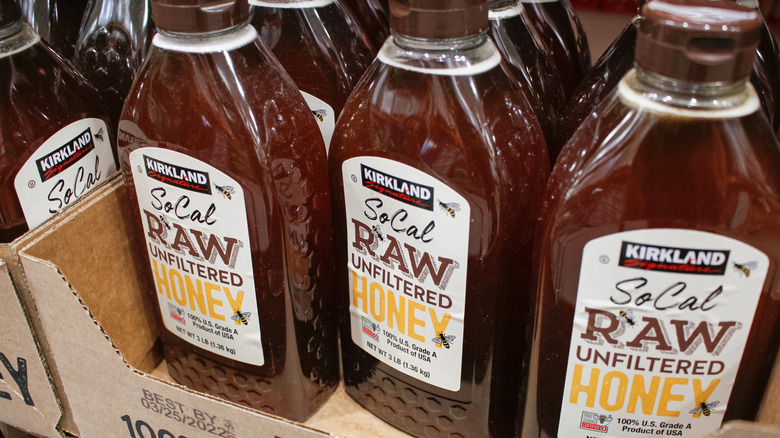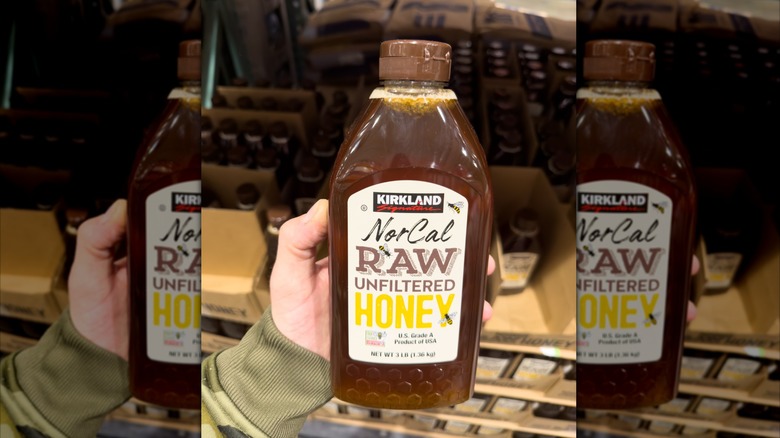The Vintage Brand Behind Costco's Raw Unfiltered Honey (But There's A Catch)
Costco is a go-to for many things, from discounted bulk-buy products like canned goods and a 72-pound wheel of Parmigiano Reggiano, to its cult-favorite food court hot dogs. Another major perk of a coveted membership is exclusive access to Costco's Kirkland Signature line, its private label, high-quality products at a discounted price. While the company is known to keep its suppliers closely guarded, some big-name brands are known to be behind certain Kirkland items. For example, Duracell provides its batteries, and Starbucks once roasted its espresso coffee beans. Among the most beloved Kirkland offerings is the Kirkland Signature raw, unfiltered honey.
According to a 2019 Costco Connection article, one of its honey suppliers is Rice's Honey (per Moneywise). As laid out in the article, Rice's provides honey for warehouses in Southern California, the Pacific Northwest in general, Texas, Colorado, and Utah. Rather than a producer of honey, the company is a processor and packager — Rice's partners with local suppliers in each region. Founded over 100 years ago in 1924, Rice's specializes in raw, unfiltered honey packaging.
But why is Rice's only listed as "one" of Costco's honey suppliers? In the list of warehouses that Rice's supplies, there's no mention of the East Coast, Midwest, or Southern markets. That gap most likely comes down to supply chain limits. Since some states produce far less honey than others, Costco can't rely solely on Rice's for nationwide coverage. Costco prides itself on locally sourced honey, and since Rice's only sources its honey from certain states, some of Costco's honey must either be sourced elsewhere or blended from multiple suppliers to fall under the broad category of local.
Costco's commitment to locally sourced honey has caused controversy
Rice's local hive brand sources honey from a vast network of U.S. honey producers, with each batch reflecting the unique flavors of its region. To highlight this, bottles are labeled by origin. For example, Colorado honey is described as being floral and light, while Pacific Northwest honey is known to have a darker, richer taste.
As the flavor of honey depends greatly on locality, its origin is an important detail for consumers to consider when deciding if they want to make a purchase. That's why Costco's labelling of its raw, unfiltered honey as "local" sparked controversy in 2022. In a membership alert sent to buyers, Costco admitted: "It has come to our attention that while the product is 100 [percent] pure honey, some of the product may contain non-local honey." This was not the first time Costco had mislabelled a product as local — it had one of the worst tuna recalls, after all. However, the company responded to the error swiftly, offering a full refund to any customer who had purchased the honey between 2019 and 2022 and completely dropping the local from the name.
Local honey isn't the only option on Costco's shelves, and some of its raw, unfiltered offerings come from international producers. For example, its organic raw unfiltered honey is actually sourced from Brazil. This is because it's immensely difficult for U.S. honey producers to meet the criteria for organic honey due to limitations of vast, pesticide-free areas for the bees to forage.


